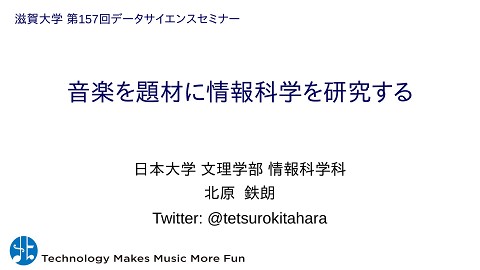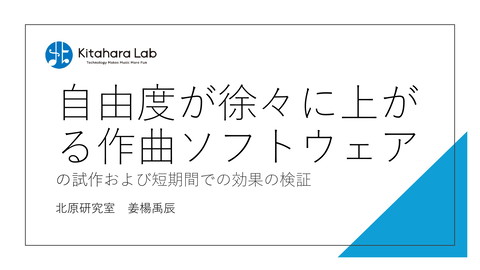Short-term and Long-term Evalulation of Melody Editing Method based on Melodic Outline
>100 Views
September 30, 24
スライド概要
Used for poster presentation in ICMC/SMC 2014
日本大学 文理学部 情報科学科 北原研究室。 「Technology Makes Music More Fun」を合言葉に、音楽をはじめとするエンターテインメントの高度化に資する技術の研究開発を行っています。
関連スライド
各ページのテキスト
Short-term and Long-term Evaluation of Melody Editing Method based on Melodic Outline Tetsuro Kitahara and Yuichi Tsuchiya Nihon University (http://www.kthrlab.jp/), Japan Contact: T. Kitahara ([email protected], Twitter: @tetsurokitahara) System Overview Note sequence HMM Pitch trajectory Extract low-order Fourier coeffs. Integrate with high-order Fourier coeffs. Melodic outline A melodic outline represents the coarse contour of the melody. ● The user can redraw the melodic outline. Then, a new melody based on the redrawn outline is generated immediately. ● Edit by user Long-term Evaluation Short-term Evaluation Aim: Comparison of usability with pianoroll Procedure Edited part Aim: Investigation of transitions of users' mind Procedure 1. Participants are given a melody generated by Orpheus. 2. Edit the melody using our system or the pianoroll interface according to the following instruction: “Make notes from 2nd to 3rd measures gradually lower in pitch, then make notes in the 3rd measure gradually raise.” 3. Answer the questions: Q1 Were you satisfied with the output melody? Q2 Was editing easy? Q3 Did the generated melody match what you expected? Q4 Do you think you drew a melodic outline as instructed? Practice (everyday) 1. Listen to 3 given melodies, then choose 2 melodies. 2. For each melody, (1) Write how you'll edit the melody in a natural language. (2) Edit the melody until satisfied. (During the editing, rate the generated melody when you listen to it.) Test (once a week) 1. Do the same thing as the practice phase. (Screen is recorded.) Participants 2. Be interviewed by us while watching the screen video. Intermediate: A, B, C, D, E (Piano or Electone, 6+ years) (A, B, C also have experience in composition) 3. Answer the questions: Q1 Were you satisfied with the output melody? Q2 Did the generated melody match what you expected? Q3 Was editing easy? Novice: F (Piano, 2 years), G, H, I, J, K, L (no music experience) Results Participants 3 people without music experience Their desire for editing becomes more specific as familiar with editing Results Up Down Up Higher Down Up Up Up Down Up * No answer High Satisfied Higher Our system is better for novice, but it's not for intermediate From interviews: ● Learned to guess what the melody is like from the outline. ● Get interested in more detailed (e.g. note-level) melody editing







